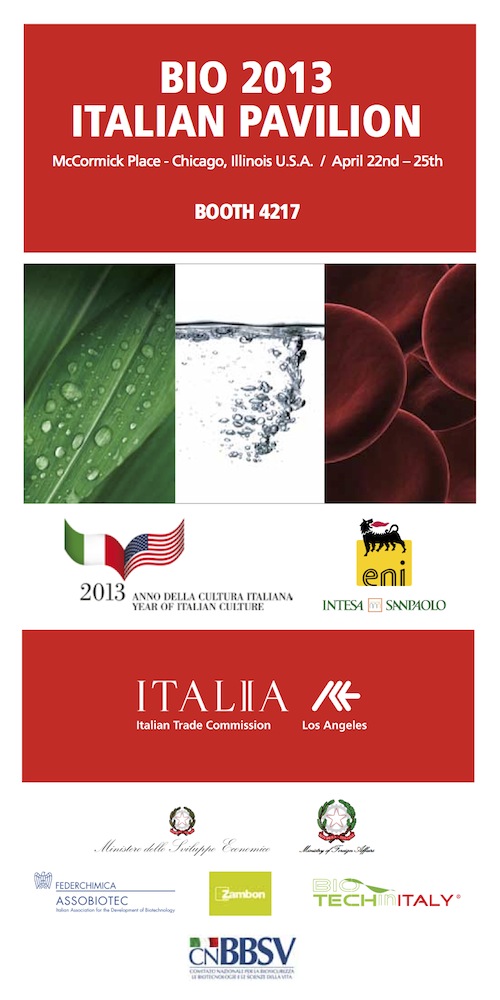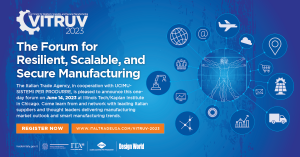THE BIOTECH SECTOR IN ITALY: A GROWING AND PROMISING REALITY
Vigorous growth and an excellent innovation capacity. These are the principal characteristics of the Italian biotech sector. In view of the tender age of this industry such characteristics are, in some respects, very surprising. Thanks to them, Italy has managed to meet a challenge that would have been unthinkable a few years ago: to finally appear on the radar screens of the major biopharmaceutical and biotechnological companies and venture capital operators. There are tangible facts behind this phenomenon: new enterprises emerging at a progressively faster rate, companies reaching maturity and consolidating themselves, but first and foremost, major R&D investments being made, which a very significant growth rate in the last few years.
Italian Night @ BIO 2013 Chicago - April 23, 2013 Networking Event - Presentation of Italian Science and Technology Parks
BIOINITALY REPORT 2013 (Click here to download the official brochure from our publication section)
The data highlighted by the BioInItaly Report 2013, by Assobiotec and Ernst & Young, in cooperation with Farmindustria and the Italian Trade Commission, are very exciting: the Italian biotech industry is composed of 407 companies, mostly small, employing less than 50 employees. With 235 companies operating in the health-care field, the "Red Biotech" is the prevalent sector.
Total turnover equals € 7,152 million, with a 6% increase compared to the previous year, whilst R&D investments have grown to € 1,832 million, with a further 2.9% increase.
The therapeutic pipeline of the Italian red biotech companies
Human health care is the spearhead segment of Italian biotechnologies, with a significant number of companies engaged in the development of highly innovative drugs and therapies.
Overall the Italian pipeline boasts a total of 359 products, of which 97 are in preclinical phase, 50 in Phase I, 107 in Phase II and 105 in Phase III clinical trials. If the number of products under development grows by 12%, the number of molecules that have reached Phase I (+13%), Phase II (+9%) and Phase III (+7) of clinical development has increased too. With regards to their origin, approximately 52% of the projects derive from foreign capital companies – notably multina- tionals' subsidiaries in Italy – and 48% from Italian capital companies, including Italian pharmaceutical companies.
{pagebreak}
Focusing our attention on the pipeline deriving from the Italian biotech companies alone, there are 136 products under development, of which 77 are in preclinical phase (56%), 17 in Phase I (13%), 32 in Phase II (24%) and 10 in Phase III (7%) of clinical development. In addition to these there are 67 research projects in the early stage or discovery phase.
Overall, approximately 46% of the projects of the Italian pipeline are biotech drugs, or biopharmaceuticals that include, by definition, monoclonal antibodies (25%), recombinant proteins (13%) and Advanced Therapies (AT) (8%).
Once again, oncology remains the therapeutic area with the largest number of projects (40%, considering also discovery activities). This percentage reflects the fact that the Italian red biotech companies' investments are clearly oriented to key medical needs, namely to those disease, such as cancer, which still lack adequate treatments. In addition to oncology, the Italian biotechnology pipeline also includes a number of projects in neurology (13%), as well as in the areas of infectivology (11%) and inflammation-autoimmune disease (10%).
The Italian biotech companies are strongly committed and perform at very excellent levels in the areas of Orphan Drugs and AT.
Indeed, out of the 49 projects currently managed by the 23 companies in our survey, which are active in the field of Rare Disease, 10 have received an Orphan Drug Designation by the EMA, 5 by the FDA and, 34 by both regulatory agencies. Within the 49 aforesaid projects, 17 originate from pure biotech companies, 6 from Italian pharmaceutical companies and 26 from the Italian subsidiaries of multinational corporations.
As regards AT, out of a total of 32 projects - 4 of which have also received Orphan Drug Designation - 17 are based on cell therapy, 8 on gene therapy while 7 apply to Regenerative Medicine. Whilst 17 of them are in preclinical phase, 6 are in Phase II and 4 are in Phase III of clinical development.
All of the above figures provide a clear evidence of the dynamic pace of the Life Sciences industry in Italy, are even more relevant if we take into account the fact that our analysis was limited only to those projects that are the result of Italian research. Indeed, even in the case of pharmaceutical companies with foreign capital, we only considered those projects which originate from R&D activities mainly conducted in Italy.
{pagebreak}
Once again we are in front of a clear division and a complementarity of roles between pure biotech companies, which are more focused on early-stage research and preclinical development - with almost 70% of their projects ranging from discovery to Phase I, and foreign-capital pharmaceutical companies which are almost exclusively involved in late-stage clinical and regulatory development activities - with 82% of their projects concerning Phase II and III trials. This latter finding further confirms the level of excellence and competitiveness achieved by Italy in the conduct of clinical trials.
However, despite Italy represents today, at the European level, a point of reference to carry out Phase II and III clinical trials, we still need to strengthen our competitiveness particularly with regard to Phase I, whose timely management is still conditioned by a number of cultural, regulatory and administrative hurdles.
At this purpose Assobiotec has signed an agreement with the Italian Medicines Agency – AIFA and the National Institute of Health – ISS, aimed at increasing knowledge and scientific competences in the specific area of Phase I studies, as well as at stimulating biopharmaceutical companies to carry out early stage clinical activities in Italy.
KEY STRENGTHS OF ITALIAN BIOTECH
Once again, this year, the biotechnology industry shows consistent dynamism and promising results, despite the continuing difficult economic situation which our companies have been struggling with, since long.
Despite a marginal decrease in the number of the companies, the Italian biotech industry ranks third in Europe after Germany and the United Kingdom as number of pure biotech companies, thus representing an extremely competitive reality, able to overcome the cyclic nature which is typical of other industrial sectors.
This development is a strong index of the Italian biotech industry's capacity of innovation, which even in an international context characterised by a little growth of investments and doubtful forecasts, has shown itself able to forge ahead, and confidently project itself towards the future.
Therefore, the research commitment is growing and in this scenario agreements between Italian companies and international partners are multiplying.
Another key factor is the excellent academic & research background present in Italy, with a strong commitment towards education and training of biotech scientists & technicians: for instance, although our country ranks 13th in terms of R&D investments in proportion to GDP (1.2%), Italian research ranks among the best in terms of quality, with a trend indicating steady growth.
{pagebreak}
In fact, Italy is one of the top three countries worldwide in the number of publications per researcher, and among the first ten countries in terms of citations per scientific article, showing a great capability of improving the research value through patents- Italy ranks third in Europe for patents per 1000 researchers.
Specifically, the growth of the emerging life sciences industry in recent years has been accelerated by the Government's commitment to develop the biotech sector. For instance, foreign investors are greeted with a variety of incentives and there are no restrictions on foreign ownership. Moreover several regional authorities, too, are actively involved in promoting biotech, through funding technology transfer agencies, incubators and seed funds.
Over the last few years, biotechnology in Italy has become an established industrial reality in all fields of application, including health, agro-food, industry. The path has been difficult, but even so the biotech sector has advanced enormously, resulting in well-earned respect on an international level – an unimaginable achievement just a few years ago.
Italy is now an attractive and competitive place for entrepreneurs and investors in the biotech field. With a strong portfolio of potentialities, the country is pursuing its own path towards a level of maturity that will certainly generate further innovation and economic growth, thus reinforcing the country's role as an international player.


























